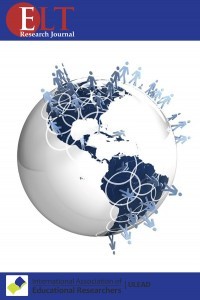The catalyst role of teacher: from the perspective of prospective teachers
The catalyst role of teacher: from the perspective of prospective teachers
Teachers have a wide range of roles
to handle the class in terms of supporting students and accomplishing their own
responsibilities. Additionally, the roles of a teacher may also change due to
many factors such as methodological development or technological innovations.
With the current changes, it seems that teachers play the role of a catalyst by
supporting and motivating the students. In this study, the term catalyst
teacher is used to describe the teacher’s role, and the teacher’s role as a
catalyst is investigated from the perspective of prospective teachers. In doing
so, the prospective teachers of English at a Turkish university were
interviewed through semi-structured interview questions to explore their
understanding of teacher cognition. The interview has three different
dimensions: prospective teachers’ previous learning experiences; their recent
experiences, and their school practicum experiences -in terms of mentor
teachers’ roles. The results of the study displayed that the prospective
teachers believe that the teacher should be a model and guide- catalyst- in the
classroom; however, they declared that their previous teachers implemented
traditional teaching techniques for teaching English. Similarly, they also
declared that their mentor teachers followed traditional teaching methods.
Keywords:
teacher role catalyst role, foreign language learner,
___
- Borg, S. (2003). Teacher cognition in language teaching: A review of research on what language teachers think, know, believe, and do. Language Teaching, 36, 81–109. Borg, S. (2015). Teacher cognition and language education: Research and practice. New York: Bloomsbury Publishing Cohen, L., Manion, L., & Morrison, K. (2007). Research methods in education. London, UK: Routledge Taylor & Francis Group. Cohen, L. Manion, L., Morrson, K. & Wyse, D. (2010). A Guide to Teaching Practice. New York: Routledge. Crooks, G. V. (2015). Redrawing the boundaries on theory, research, and practice concerning language teachers’ philosophies and language teacher cognition: Toward a critical perspective. The Modern Language Journal, 9(3), 485–499. Davidoff, S. & Lazarus, S. (1997). The learning school: An organizational development approach. Juta Gagne, F. (2007). Ten commandments for academic talent development. Gifted Child Quarterly,51 (2), 93-118 Gavora, P. (2000). The pedagogic education. Brno: Paido Gay, L.R., Mills, G.E., & Airasian P. (2006). Educational Research. Competencies for Analysis and Applications. New Jersey: Pearson Merrill Prentice Hall. Hallinan, M. T. (2008). Teacher influences on students’ attachment to school. Sociology of Education, 81 (3), 271-283. Harmer, J. (2001). The practice of English language teaching. London: Longman Harmer, J.(2007). The practice of English language teaching. Harlow, England: Pearson Longman Horsley, J. (2012). Teacher catalysts: Characteristics of teachers who facilitate high academic success. Australasian Journal of Gifted Education, 21 (1), 23-31 MacLeod, R. B. & Napoles, J. (2012). Preservice teachers’ perceptions of teaching effectiveness during teaching episodes with positive and negative feedback. Journal of Music Teacher Education, 22 (1), 91-102 Kubanyiova, M. (2015). The role of teachers’ future self-guides in creating L2 development opportunities in teacher-led classroom discourse: Reclaiming the relevance of language teacher cognition. The Modern Language Journal, 9(3), 565–584. Kubanyiova, M., & Feryok, A. (2015). Language teacher cognition in applied linguistics research: Revisiting the territory, redrawing the boundaries, reclaiming the relevance. The Modern Language Journal, 9(3), 435–449 Kvale, S. (1996). Interviews: An Introduction to Qulitative Research Interviewing. Thousand Oaks: SAGE Publicaion. Ögeyik, M. C. (2016). Investigating the Impacts of Previous and Current Learning Experiences on Students Teachers’ Teaching Experiences. Kuram ve Uygulama Eğitim Bilimleri-Educational Sciences: Theory & Practice. EDAM, 1479-1506 Pickett, L., & Fraser, B. (2010). Creating and assessing positive classroom learning environments. Childhood Education; ProQuest, 321-326. Rogerson, C. & Chomicz, G. (2014). Catalytic teaching: a teaching equation transfers to enhanced student learning. Journal of student Engagement: Education matters. 4 (1), 3-13 Shein, P.P. & Chiou, W-B (2011). Teachers as role models for students’ learning styles. Social Behaviour and Personality, 39 (8), 1097-1104 Sinagatullin, I. M. (2009). Teaching is more than Pedagogical Practice: thirty-three strategies for dealing with contemporary students. Lanham, MD: Rowman & Littlefield Education. Skosana, P.S. & Monyai, R. B. (2013). The Teacher as a Catalytic Agent in the implementation of the Curriculum. International Journal of Humanities and Social Science Invention. ISSN(online): 2319-7722. Švec, Š. et al. (1998). Metodológia vied o výchove. Bratislava: IRIS.
- Yayın Aralığı: Yılda 2 Sayı
- Başlangıç: 2012
- Yayıncı: Uluslararası Eğitim Araştırmacıları Derneği
